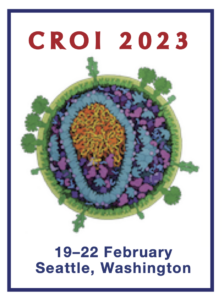30th Conference on Retroviruses and Opportunistic Infection (CROI 2023)
1 February 2023. Related: Conference reports, Conference index.
19–23 February 2022, Seattle and virtual
Introduction
 This year the annual Conference on Retroviruses and Opportunistic Infections (CROI) will be held in Seattle and as a virtual meeting.
This year the annual Conference on Retroviruses and Opportunistic Infections (CROI) will be held in Seattle and as a virtual meeting.
This will be the 30th meeting for a conference that was initially set up in response to the IAS decision to no longer hold the World AIDS Conference in the US due to the visa ban against people living with HIV.
However, CROI’s focus on basic and clinical science meant it rapidly became the most important annual scientific meeting, limiting the formal engagement of pharmaceutical companies (even as attendees), and developing a training and scholarship programme, including for community participants.
Although limited access to the programme is available in the week before CROI, access to abstracts is restricted until the day before the meeting starts.
www.croiconference.org/preliminary-agenda
Two versions of the detailed programme are available as PDF files – with and without the abstracts:
https://www.croiconference.org/croi-2023-resources/#program-guide
All conference material will become open-access a month after the meeting.
Based on the programme outline, the following topics are likely to contribute to the meetings highlights,
- New drugs, formulations and pipeline compounds are always presented at CROI. This is likely to include further updates on long-acting lenacapavir (for for treatment and PrEP), islatravir as trestment and long-acting bNAbs (10-1074LS, 3BNC117-LS and N6-LS).
- New studies will be presented on injectable ART.
- Detailed results from the MOSAICO HIV vaccine study, that was discontinued in January 2023 due to lack of efficacy and implications for future vaccine research.
- PrEP – both oral and injectable – will include a focus on equitable access and distribution. Several studies are likely to report on using long-acting injections as PrEP.
- SARS-2 is likely to still feature in the programme, often in related to HIV, both over virology and epidemiology, and also to cover long-COVID.
- Mpox is also likely to feature even though the 2022 outbreak is now largely resolved, including how to limit future outbreaks.
- Advances in cure-related research including basic science approaches to the viral reservoir.
- Specialist sessions on women’s health, pregnancy and paediatric care.
- Adherence in the era of modern ART.
- The Scott M. Hammer workshops for new investigators and trainees held every year on the say before CROI, provides state-of-the-art lectures on key areas of HIV treatment, signposting to related studies that will be presented in the upcoming main conference.
CROI 2023: ANTIRETROVIRALS
- Pipeline HIV drugs and formulations for treatment and PrEP
- Six-monthly ART – lenacapavir + dual bNAbs maintains undetectable viral load for 26 weeks after single doses
- Other lenacapavir studies – experienced and naive updates, the dosing window, HIV-2 and PrEP
- Similar PK profile for thigh vs gluteal CAB/RPV-LA injections: accidental intravenous injection
- Efficacy of N6LS monotherapy correlated with baseline factors
- CAB/RPV-LA levels are not reduced after switching from efavirenz
CROI 2023: TREATMENT STRATEGIES
CROI 2023: PREGNANCY
CROI 2023: SIDE EFFECTS
CROI 2023: COMPLICATIONS
This report was first published on 15 February but was updated a week later to include details on CROI becoming open access.

